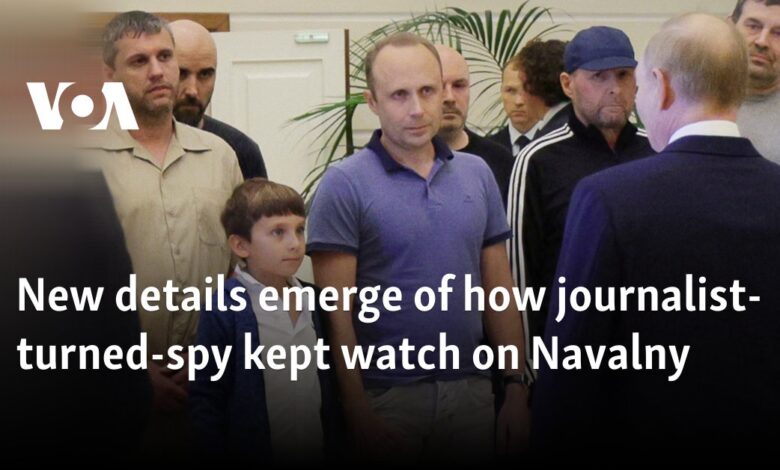New details emerge of how journalist-turned-spy kept watch on Navalny

For nearly a decade, a Spanish Russian freelancer used his cover as a journalist to spy on Russian dissidents for Moscow, including late opposition leader Alexei Navalny.
Disclosures from intelligence services have shed further light on how Pablo Gonzalez operated.
Posing as a journalist, Gonzalez allegedly sent the GRU, the Russian military intelligence, photographs and the Wi-Fi passwords of venues for meetings of exiled opposition groups.
Gonzalez was also accused of preparing reports on forums attended by officials from former Soviet Union countries.
His alleged investigations centered on prospective NATO members, dissident members and the security structures of neighboring states.
His cover as a freelancer who reported for Spanish media and contributed to international networks, including Spain’s EFE, Deutsche Welle, and VOA was so good that even after his arrest in Poland in February 2022, some supporters still believed it was a case of mistaken identity.
In August, Russian President Vladimir Putin welcomed Gonzalez at an airport in Moscow as part of a hostage swap in which American journalists and Russian rights activists were exchanged for an assassin and spies. Their greeting ended any speculation.
Gonzalez, a married father of three, always denied spying and was never formally charged.
But on Sunday, Spanish newspaper El Mundo reported it had obtained access to dozens of reports on Gonzalez, citing “Spanish and foreign intelligence sources.”
The Polish prosecutor’s office said in a report that Gonzalez “formally belonged to the structures of the (GRU)” from April 2016.
He was described as “a journalist and political scientist by profession, married with three children, who covered current affairs throughout the former Soviet Union with a monthly income of between €1,500 ($1,645) and €2,000 ($2,194) and collaborated with various news outlets.”
VOA hired Gonzalez via a third-party freelance media platform. After learning of his arrest in Poland, the broadcaster removed his content.
Miguel Angel Oliver, president of EFE, told VOA that his network had a ” brief collaboration” with Gonzalez, principally about photographs at the start of the Ukraine war.”
Espionage files
El Mundo described how Polish investigators allegedly uncovered a report in Gonzalez’s possession containing “the addresses of clinics in Barcelona and Lausanne” in Switzerland where Navalny was treated in 2017. The document is dated June 14, 2017.
Navalny met Gonzalez twice in Europe, once when Navalny underwent eye surgery in Barcelona after being attacked with a chemical substance. Gonzalez allegedly sent details of the clinic to Russian authorities, even taking a selfie with Navalny.
In September 2020, after Navalny survived a poisoning attempt, Gonzalez posted the selfie on social media. In a post, he said Navalny was not being targeted by the Russian government, investigators alleged.
Gonzalez also suggested on social media that Navalny’s anti-corruption platform FBK would “continue operating as usual with more support and permissiveness,” saying the opposition leader was “neither dead nor incapacitated.”
In 2023, Navalny returned to Russia and died in a high-security prison in Siberia in February 2024.
On the surface, Gonzalez worked as a reporter, specializing in the post-Soviet Union republics.
Polish intelligence said Gonzalez began reporting back to Moscow when he began traveling abroad.
Documents found in his possession between 2016 and 2021 detail that after a stay in Georgia, Gonzalez sent a report to the GRU about the “issue of post-Soviet states and accession processes” and “NATO members and aspiring members’ attitudes towards Russia.”
Gonzalez is also accused of sending information about key security infrastructure in Poland. He allegedly published “disinformation articles on the internet aligned with the Russian Federation’s official propaganda policy,” the files seen by El Mundo said.
The newspaper said it had reviewed the contents of laptops, phones, iPads and memory cards, seized when Gonzalez was arrested. Electronic devices that could be used to establish clandestine communication channels were discovered, according to Polish investigators.
When questioned, Gonzalez denied spying, according to Polish court documents viewed by the Spanish newspaper.
However, when confronted with documentary evidence, Gonzalez “refused to comment.”
His lawyer, Gonzalo Boye, said the details published by El Mundo left him feeling “helpless.”
“Polish law prevents us from talking about anything that is part of the criminal process,” Boye told VOA. “It is as if the intention is to show Pablo as being guilty when for more than 2 ½ years, they were not able to bring an accusation and bring him to trial.”
The lawyer, who has represented American whistleblower Edward Snowden and Carles Puigdemont, a Catalan separatist leader, compared Gonzalez to Evan Gershkovich, an American reporter unjustly detained in Russia for nearly 500 days on false espionage charges.
Gonzalez was one of several suspected Russian spies released in exchange for Gershkovich and other political prisoners.
“It is clear that there is a double standard in dealing with the case of one and the other journalist,” Boye told VOA, adding, “But I understand that this is what happens in political contexts like the one we are living in at the moment when one is on one side or the other, when I prefer to be on the side of truth and the rule of law.”
Through Boye, VOA asked Gonzalez for a comment but did not receive a response.
A source with knowledge of the Russian intelligence sector who did not want to be named, told VOA that Gonzalez grew up in Basque Country, where sympathies for the independence movement are common. And in left-wing circles, support for Putin is not unusual.
This meant many who met him did not challenge his pro-Russian roots, far less suspect he worked for Russian intelligence.
Alongside spying on Navalny in 2016, Gonzalez infiltrated the Boris Nemtsov Foundation for Freedom, named after a Russian opposition politician who was assassinated in 2015. At the foundation, he became close with key members of the group.
Nemtsov’s daughter Zhanna Nemtsova posted on social media that she was a victim of Gonzalez.
Spanish secret services, speaking on background to a VOA reporter, said they believed he was a Russian spy.
Polish security services said Gonzalez had been “carrying out intelligence tasks in Europe.”
Richard Moore, head of Britain’s foreign intelligence service MI6, said at the Aspen Security Forum in 2022 that Gonzalez was an “illegal” arrested in Poland after “masquerading as a Spanish journalist.”
“He was going into Ukraine to be part of their destabilizing efforts there,” Moore said.




